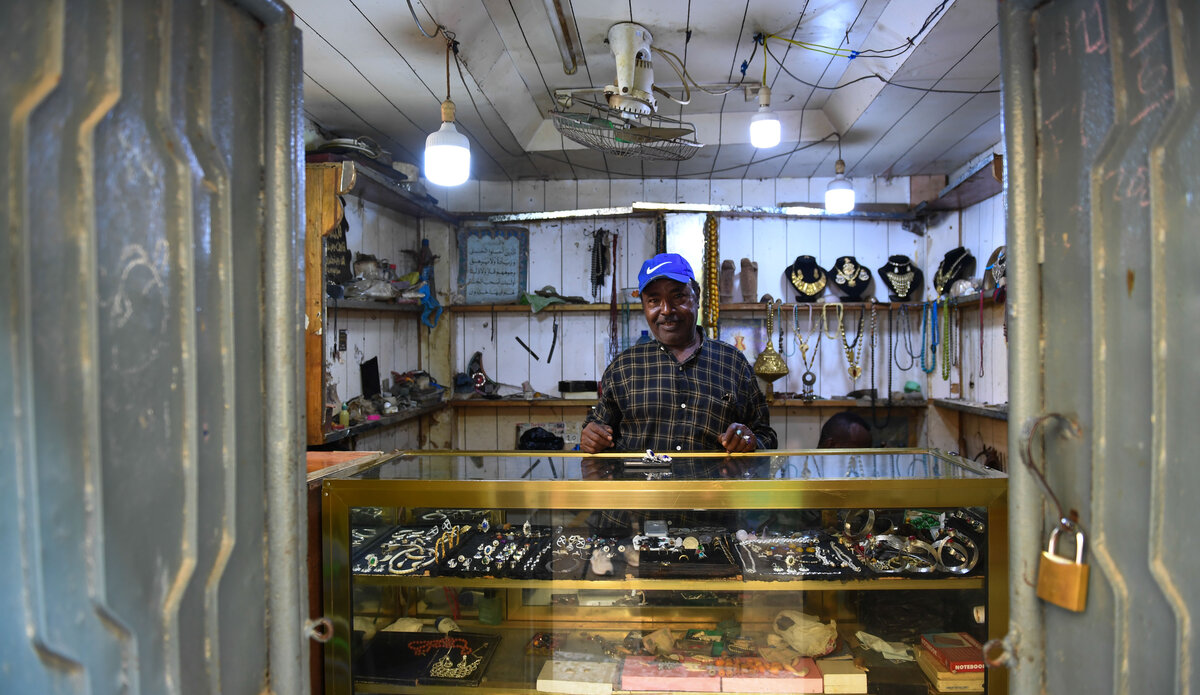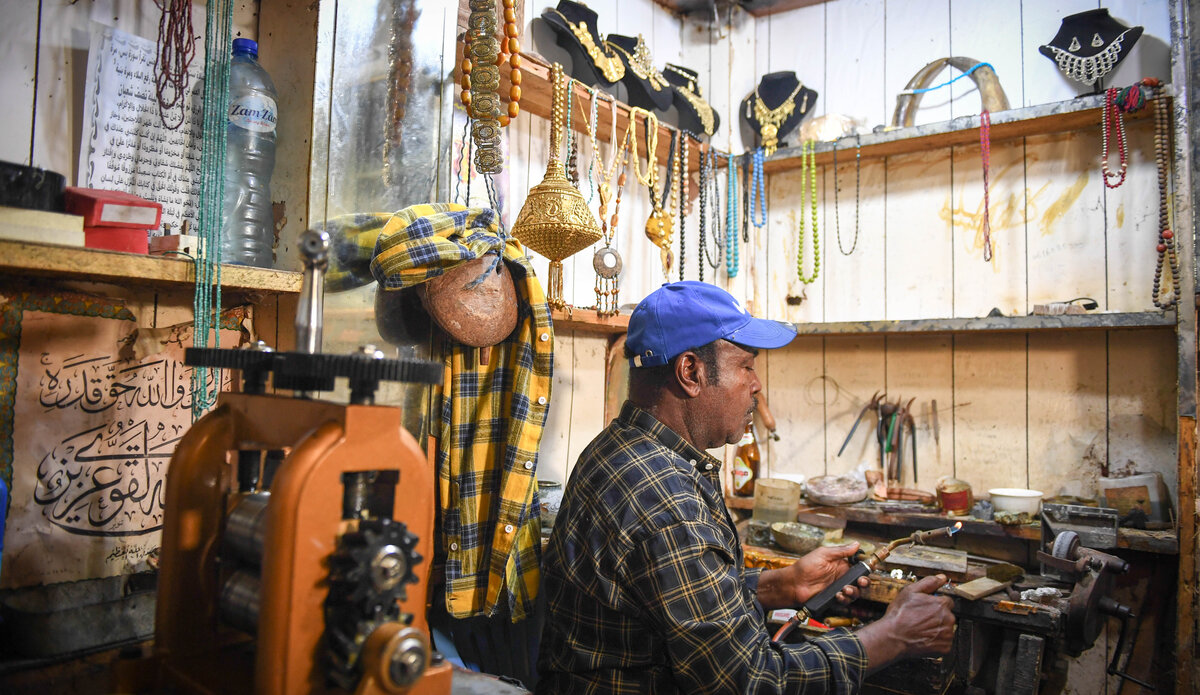Qalin Shube goldsmith Omar Nur Basharah: “This is more than a job. It runs through our veins and forms the basis of our history”
Mogadishu – Walking down a dilapidated alley in Mogadishu’s Hamarweyne district, the first thing a passer-by notices is the faint sound of metal tapping and twisting emanating from the warren of workshops and storefronts.
One of the people making that sound is 63-year-old Omar Nur Basharah.
Surrounded by files, pliers, hammers and anvils, his back hunched, his eyes focused, he puts the finishing touches to a gold necklace ordered for a wedding ceremony.
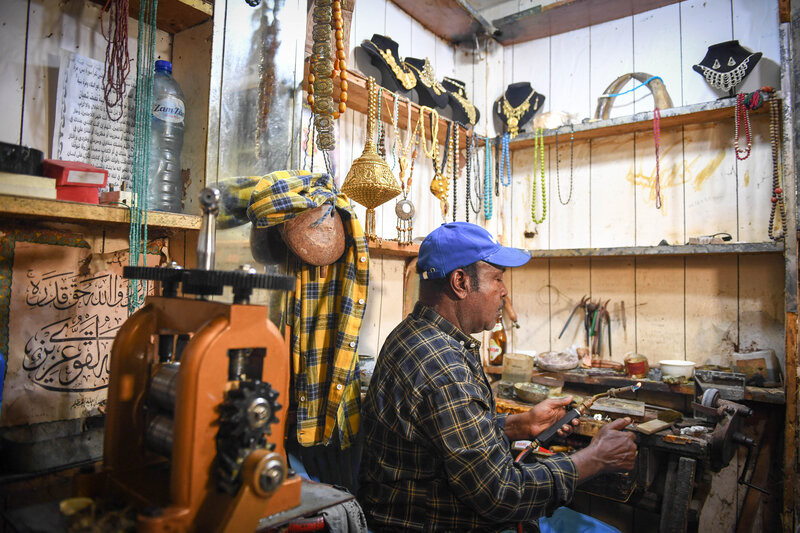
It is something that Mr. Basharah has done for the past 50 years, having learned the craft at a young age from his father. But he worries about whether the craft – and the place it has in his community – will last another 50 years.
“I started doing this at the age of 13. I was ably mentored by my father,” says Mr. Basharah, one of the few remaining goldsmiths from the Qalin Shube community, renowned for their skills in gold and silversmithing.
“It holds a special place in our community. We are called Qalin Shube (translation: ‘the one who smelts silver’) and we are known for this. People respect my community for this craft,” says Mr. Basharah.
“I really want the youth to know that these skills are valuable and worthy of preservation. They should be informed about their history and heritage,” he adds. “We make extremely beautiful products from gold and silver. This is more than a job. It runs through our veins and forms the basis of our history.”
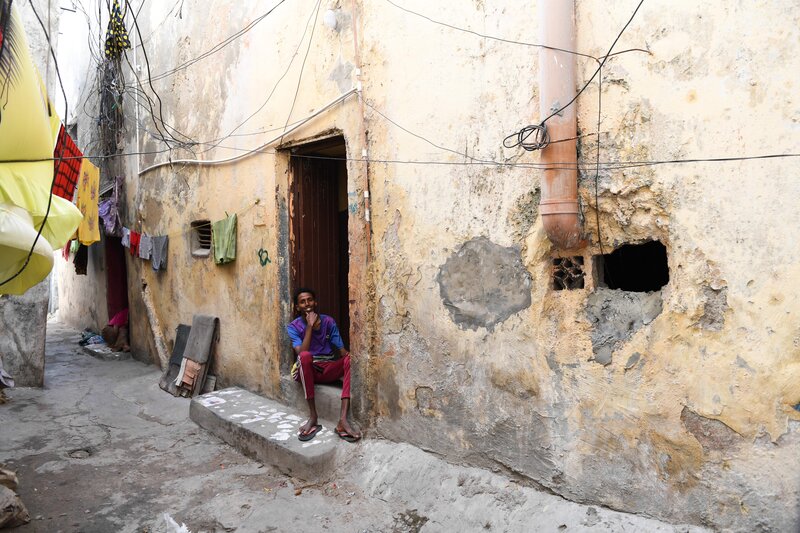
Historical roots
The Qalin Shube community are part of broader Banadiri community that lives along the southern coast of Somalia. In the country’s capital, Mogadishu, they are predominantly found in its Hamarweyne district.
Within the Banadiri community, there are numerous other smaller groupings. They include the Shanshi, famed for their business acumen and confectionary skills; the Morshe and the Bandhabow, celebrated for their hand-woven fabrics; and the Reer Faqi, well-known for their piety and high number of respected ulamas (translation: Islamic scholars).
But when it comes to finely-crafted, made-to-order handmade jewellery for special events such as weddings, birthdays and anniversaries, it is the Qalin Shube that Somalis seek out.
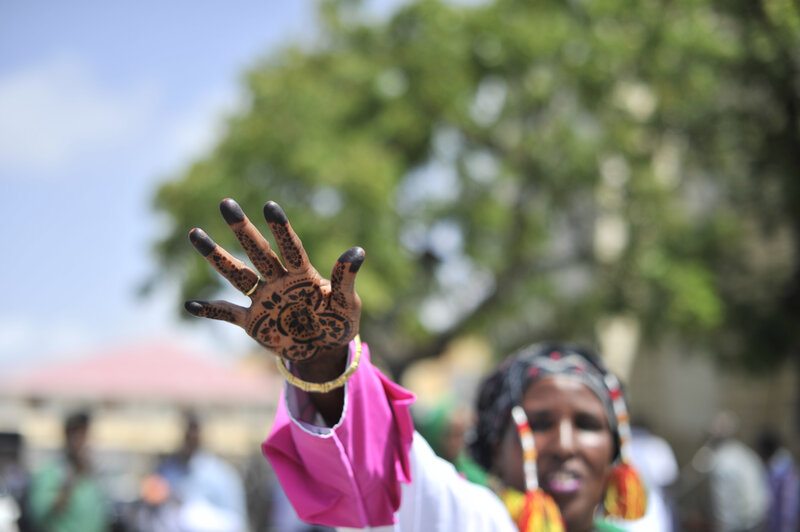
“Crafting jewellery out of gold was first introduced to Somalia by Indians in the middle of the 20th century. My father acquired these skills through the Indian traders and passed them to me,” says Mr. Basharah.
Over the ensuing decades, the gold and silversmithing industry thrived throughout Somalia and it became known for its craftsmanship throughout East Africa and beyond.
“Our products used to be displayed abroad such as in the Italian town of Milano,” notes Mr. Basharah. “Sadly though, that is no more.”
Changing times
The start of Somalia’s civil war in the early 1990s changed everything.
During the bloody conflict, most of the small Qalin Shube businesses that had survived generations were destroyed, and some of the best goldsmiths in Somalia were killed or fled.
“The buildings and our machines were looted, our livelihoods destroyed, and many of us were forced to flee,” Mr. Basharah recalls.
Even for those who survived and remained, their ability to make a living was reduced dramatically as their customer base was decimated.
But some of the Qalin Shube continued their work, even in reduced circumstances. Their persistence was not solely based on income – there was a degree of communal pride centred on preserving the artisanal work so closely associated with them.
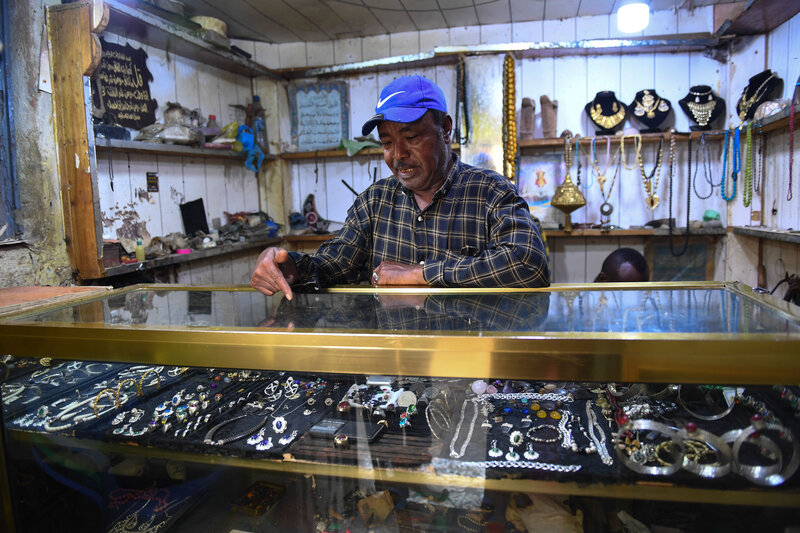
With slightly more than a dozen women and men still working as smiths, the path forward is not promising – most of the remaining artisans are ageing and few young Somalis want to follow in their steps. The Qalin Shube believe it takes at least two to three years to fully master the skills involved in heating and moulding precious metals by hand into fine jewellery using rudimentary tools.
A father of five, Mr. Basharah is trying hard to transfer these unique skills to his children, but interest from them and other youth in their community is low.
“There are experts in this field in Hamarweyne. There are about 20 men and six women. These people are ready and willing to pass this knowledge on to the young generation,” says Mr. Basharah.
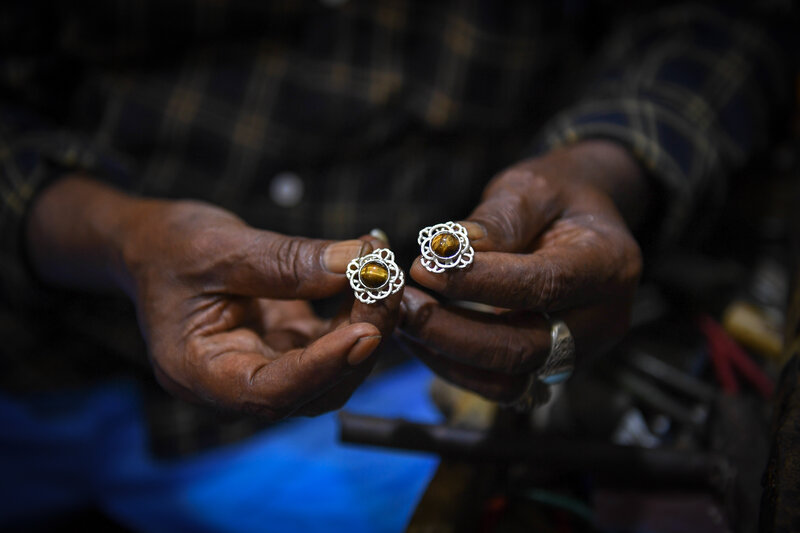
Customer interest
Ironically, while interest in learning how to become a smith has declined precipitously, there is still customer interest in their work.
According to Mr. Basharah, the high quality of the Qalin Shube’s products, coupled with their ability to customise products to suit the personal tastes and budgets of their clients, has won them a loyal customer base, including some from abroad.
“Our products are loved because of the manual skills involved, the quality, the design and the beauty. Women wear our gold during special occasions, such as weddings and other social gatherings such as traditional Dabshidka (translation: ‘the lighting of the fire’) and they really appreciate what we make,” Mr. Basharah says.
“Customers sometimes ask us to produce a particular design for them and that freedom to choose what they want is particularly important,” he continues. “It is what keeps our hopes alive.”
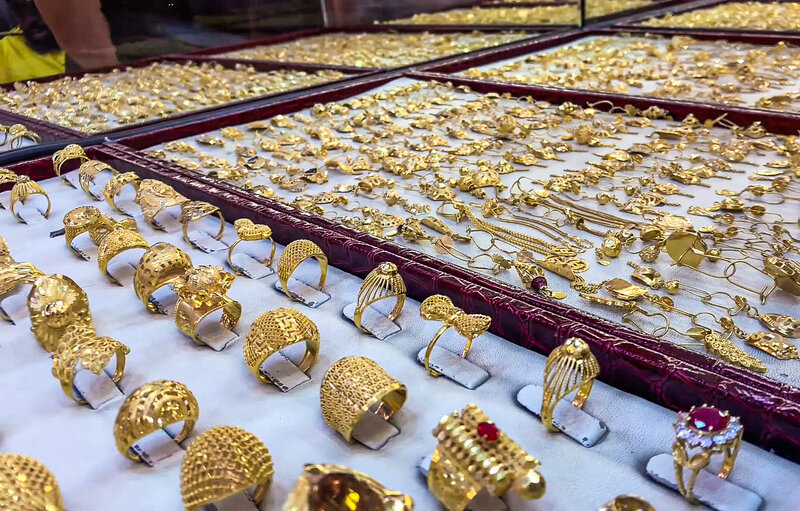
Way forward
But asides from finding young Somalis willing to learn, the smiths of the Qalin Shube face other challenges: competition from imported jewellery, difficulty in finding tools on the local market and a dearth of quality raw materials, to name a few.
“We cannot display gold publicly because we can be killed [by robbers] or have our goods stolen due to the value and importance placed on gold. We are forced to mostly concentrate on silver which generates less income,” says Mr. Basharah.
The artisan believes the establishment of a training centre to attract and retain future gold and silversmiths can help preserve this aspect of the Qalin Shube’s heritage.
Mr. Basharah is not alone in this respect.
“These skills were passed from generation to generation but today, it is going through a critical stage, which makes conservation extremely necessary,” says Abdurahman Khalid Macow, from the local non-governmental organisation WeLiterate, which promotes literacy and self-reliance among vulnerable communities in Mogadishu to address injustice, discrimination and poverty and help preserve their heritage and traditional endangered occupations in Somalia.
“Depending on imported products all the time is tantamount to allowing the disappearance of your heritage, crafts, civilisation and we should never allow that to happen,” Mr. Macow adds, noting that encouraging the consumption of locally-made products could help support the metal work.
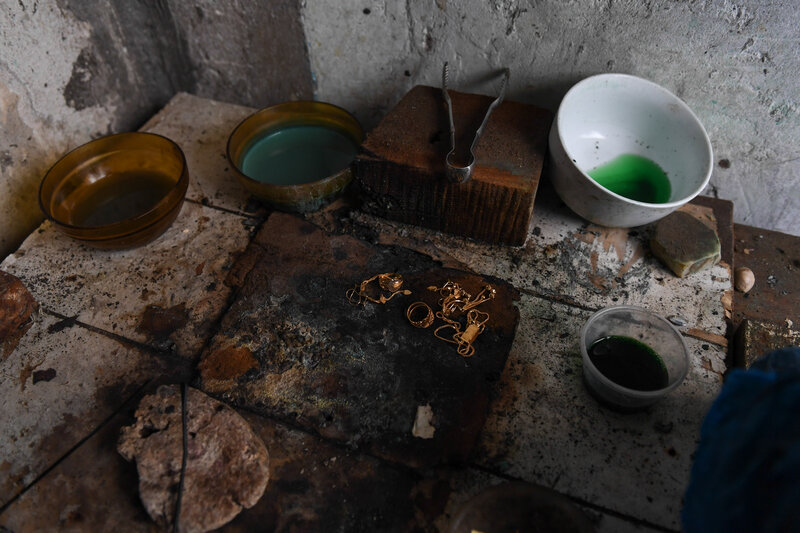
The United Nations agrees.
The Office of the UN High Commissioner for Human Rights (OHCHR) and the world body’s operations in Somalia work with local partners and Somali communities to highlight the richness and diversity of Somali people and culture and promote meaningful participation in a peaceful and inclusive future for all Somalis.
“Mogadishu’s Hamarweyne district has a rich history and fascinating cultural heritage, and the goldsmithing community and its craft is a testament to that. Goldsmithing is not only a craft but an essential part of the cultural identity of one of the Banadiri communities in Mogadishu,” says the Chief of the UN Assistance Mission in Somalia’s (UNSOM) Human Rights and Protection Group, Kirsten Young, who also serves as the OHCHR Representative to Somalia.
“The community continues to preserve its craft despite challenges of insecurity, violence and displacement, and it is important to celebrate this achievement but also to raise awareness of these challenges,” Ms. Young adds.
The UN Educational, Scientific and Cultural Organization (UNESCO) also works to protect and safeguard cultural and natural heritage, from cherished historic monuments and museums, to living heritage practices and trades.
“Skills like Omar’s are learnt at the feet of a master, in this case his father, and are irretrievably lost if the apprentice-master relationship falters for just one generation. Just as in the loss of an eco-system, or a language, the world is then a poorer place,” says the Head of UNESCO’s Somalia Desk, Mark Wall.
 UN
UN
